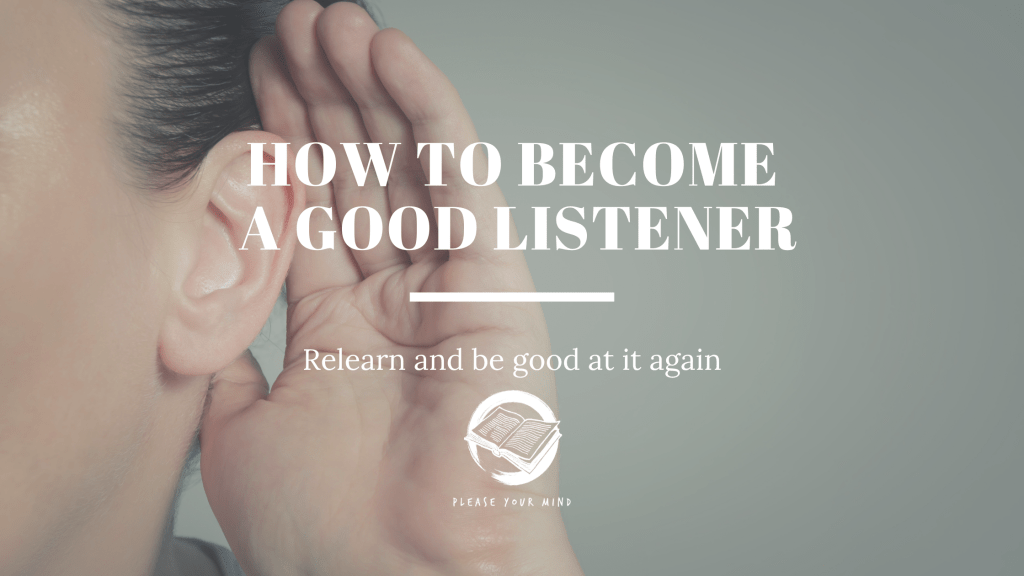It is quite astonishing that proper listening is not natural for many of us. Furthermore, it is mistaken that listening is a passive activity. But it is actually a tough job to do. Today we will go on the simple and basic principle of what listening consists of. After this post, you should know how to become a good listener.
What good listening actually means – How to become a good listener

With time I realize people stop listening. Instead, they are trying to fight each other with arguments. Here, the personal ego is in our way of proper listening. I actually learned a lot from past relationships with past friends. Many friendships were lost because of not good listening. I always wanted to convince people that my way of argument was right. And I did not pay any attention to their arguments. Moreover, I tried to shut them down so they have to chance to argue back.
Genuine, real listening is a rare commodity and a great gift. Because we give people our most valuable asset: attention. Here are some suggestions on how to become a good listener:
1. Listen, do not talk at all
I see my friends doing these mistakes all the time when they try to hit upon a girl or a boy. When the other one is talking about a topic they mostly interfere with a personal story related to this topic. For example, when they are talking about how they hate their job, my friends try to empathize with a story of theirs about how they hate their job. It sounds like a good strategy to discover similarities.
But, the other one has the feeling that your problems are as bad as theirs. As a result, we give them a feeling that their problems are not as troublesome as it is. We did not pay attention, not to what they said, but instead, to how they felt.
It is obvious and fatal to break this simple rule of listening. All problems are not the same. It is and will never be the same. Furthermore, all experiences are individual, and more importantly, it is not about you.
I have this friend who is recently single. And she was never single for more than 3 months. As a result, she could not read who has a crush on her. She told a story of a friend who she sees as a friend. Surprisingly for her, he confessed his love. Confused and shocked she asked how she should deal with it. Instead of listening, her friend somehow judged her situation. “How can’t you see it? It was obvious. You are so naive not to see it. And this situation is not something new. So, stop being shocked.” Not only doesn’t she listen to her friend, but she also judged her on her behavior.
2. Be a friend, not a judge
At the early age of 20, I did not understand why it was a problem to judge people when I listened to my friend’s problems. Until I face it myself. Back in my earlier post of gossiping I finally understand that people want to be heard and want empathy from their friends. When people open up to someone, and it counts more heavily for friends, they seek understanding and empathy from them. And any kind of judgment is a hard pill to swallow.
For the listener, it can be hard not to judge or give any advice. Because we want to befriend someone who shares the same value as ours, right? Wrong. My friend can be the biggest hoe of all time and I should not judge her even when I think sex is for marriage only. Why? Because it does not matter what a friend does or thinks when she is a true friend to me. On many occasions, people try to create their friends for their ideal ones. But a true friend and listener shall not do it.
Instead, suppress your urge to judge and ask how they feel and jump back to the exciting parts of the story. Use this:
- ‘Earlier you said that…’
- ‘How was it for you when…’
- ‘And what happened next?’
3. Don’t finish another person…
Some people tend to impatiently finish the sentence or the thought of the person they are talking to. Even though they might talk or think slowly do not interrupt them. It might show empathy but it does not.
Also, when you finish another person’s sentence it shows your impatience about the problem or, even worse, the person. Completing their sentences shows actually a lack of empathy. With that, you might tell them that you want to solve the problem as quickly as possible. So, you can talk about yourself.
4. Notice the little things
This will tell if you listen carefully. Try to remember what they said and pick it up later on: “You mention your mother, what is your relationship with her?”
It will let the person know that you really care and pay attention to them.
The most romantic gift: to listen to another’s anxieties for one hour, without judgement or “solutions”, as an analyist might
Alain de Botton

